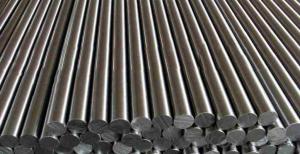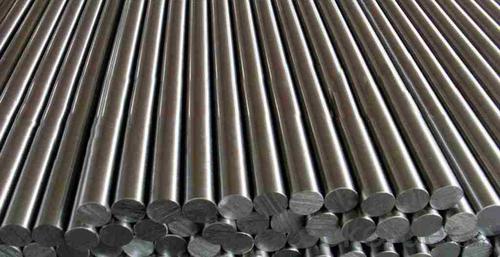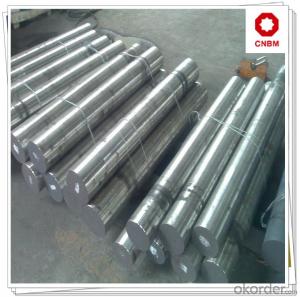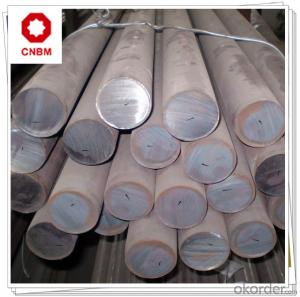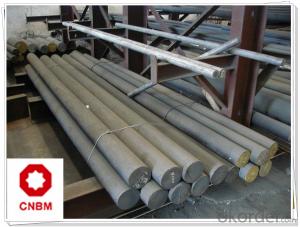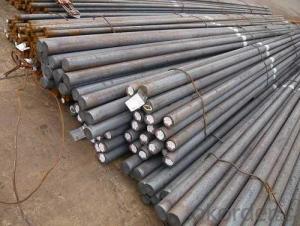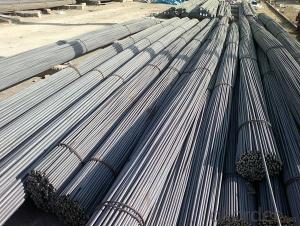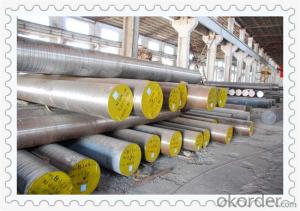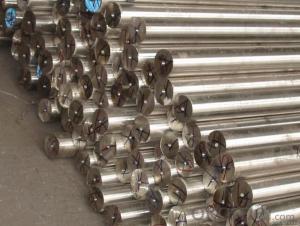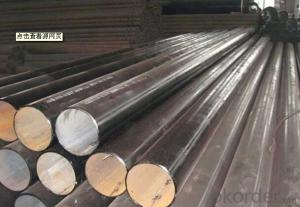Hot Rolled Steel Round Bars for Making Parts
- Loading Port:
- Tianjin
- Payment Terms:
- TT or LC
- Min Order Qty:
- 50 m.t.
- Supply Capability:
- 10000 m.t./month
OKorder Service Pledge
OKorder Financial Service
You Might Also Like
Product Description:
Hot Rolled Steel Round Bars for Making Parts is used for manufacturing ball, roller bearing steel and rings. Bearing in work is under great pressure and friction, so have high demands bearing steel and hardness and resistance, and high elastic limit.
Bearing steels are used for ball and roller bearing applications and are comprised of low carbon steels and high carbon through harden able steel.
For example, bearing ring, steel rolling mill, machinery, 100Cr6 bearing steel ball is widely used in high-speed and low-noise bearing, bicycle, motorcycle, automobile, bags electronically.
Product Applications:
Hot Rolled Steel Round Bars for Making Parts are ideal for structural applications and are widely used in the construction of buildings and bridges, and the manufacturing, petrochemical, and transportation industries.
1. Steel round bar products is used in construction and a large number of architectural and engineering structures. And it can be used in production of handrail, windows, machinery, telecom and curtain wall.
2. It can be used in the fields like metal mines, cement plants, water coal slurry, power stations and chemical industry.
3. Besides, we can supply some especial material steel round bar that can be used for main shaft of steamer, hummer shank, with big section and supper force.
4. Recommended watchcase factory, screw factory and other cold stamping products industry use.
Product Advantages:
OKorder's Hot Rolled Steel Round Bars for Making Parts are durable, strong, and resist corrosion.
1. The steel in which the main interstitial alloying constituent is carbon in the range of 0.12–2.0%.
2. As the carbon percentage content rises, steel has the ability to become harder and stronger through heat treating; however it becomes less ductile.
3. Regardless of the heat treatment, higher carbon content reduces weld ability. In carbon steels, the higher carbon content lowers the melting point.
4. Quality should be in conformity with the specification of the manufacturer. Quantity and packing conditions should be in conformity with the term in the contract.
Main Product Features:
· Premium quality
· Prompt delivery & seaworthy packing (30 days after receiving deposit)
· Corrosion resistance
· Can be recycled and reused
· Mill test certification
· Professional Service
· Competitive pricing
Specifications of Hot Rolled Steel Round Bars for Making Parts
1. Grade: Q235, A36, SS400, S235JR
2. Feature: Unbreakable, grinding resistant and high impact value
3. Diameter: 8mm-150mm
4. Performance: Mainly for civil construction
5. Characteristics: Even hardness, no deformation, no breaking, no mal-roundness
6. Technique: Hot rolled
7. Mass: Mass (kg/m) = Diameter (mm) × Diameter (mm) × 0.00617
Packaging & Delivery of Mild Hot Rolled Steel Round Bars for Bults and Nults
Packaging Detail: All goods are packed in bundle with steel strips and shipped by break bulk vessel or container (depend on target market and different ports)
Delivery Detail: 45 days
Trade terms: FOB, CFR, CIF
MOQ: 25 tons per specification; we can negotiate the quantity if the specification is normal or we have stock of one specification.
Weight: The price invoicing on theoretical weight basis or actual weight basis depends on customer’s request.
Shipment: The shipment of bulk break or container is depends on customer’s request and the situation of the port of destination.
Documents given: Full set of original clean on board bill of lading; Original signed commercial invoice; Original packing list; Policy of insurance; Certificate of origin and what the target market needs.
Production Flow of Hot Rolled Steel Round Bars for Making Parts
Material prepare (billet) — heat up — rough rolling — precision rolling — cooling — packing — storage and transportation
FAQ:
Q1: The products are invoicing on theoritical weight or on actual weight?
A1: We can do it in both manners, according to the customers' request.
Q2: What is the normal tolerance of Hot Rolled Steel Round Bars for Making Parts?
A2: Normally 3%-5%, but we can also produce the goods according to the customers' requests.
Q3: How soon can we receive the product after purchase?
A3: Within three days of placing an order, we will begin production. The specific shipping date is dependent upon international and government factors, but is typically 7 to 10 workdays.
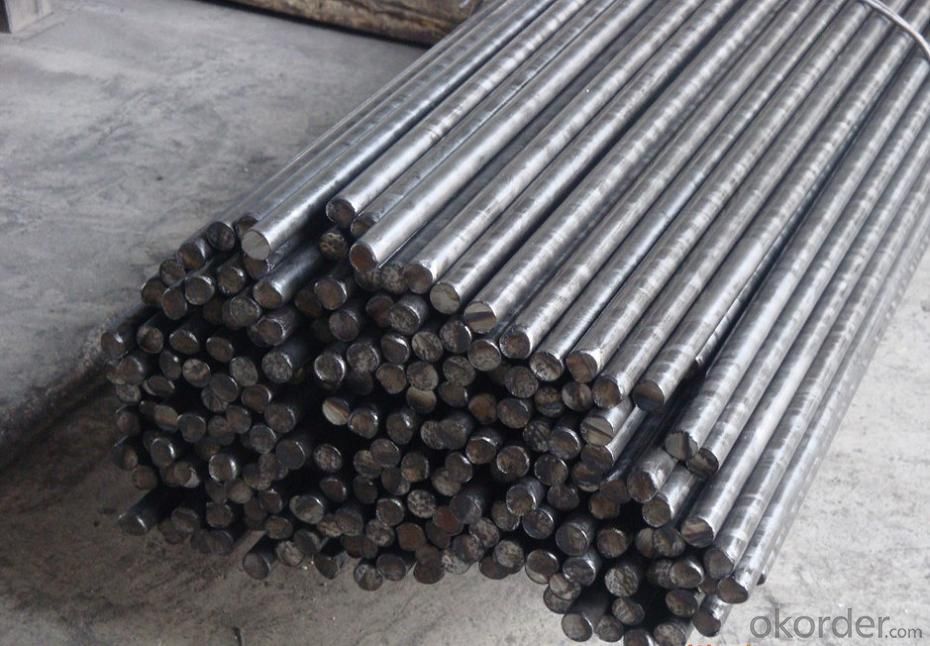
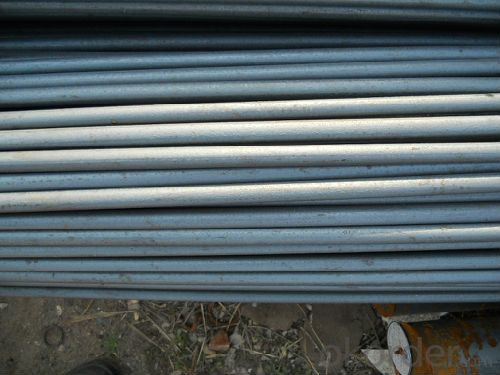
- Q: What are the advantages of using nickel-chromium-aluminum alloy steel round bars?
- There are several advantages of using nickel-chromium-aluminum alloy steel round bars. Firstly, this type of alloy steel offers excellent strength and toughness, making it suitable for applications that require high resistance to corrosion, heat, and oxidation. Secondly, the inclusion of nickel and chromium enhances the alloy's ability to withstand extreme temperatures, making it ideal for use in environments with high heat or pressure. Additionally, the aluminum content promotes good formability, allowing for easier machining and fabrication. Lastly, the nickel-chromium-aluminum alloy steel round bars exhibit good weldability, making them versatile and easy to work with in various industries such as aerospace, automotive, and manufacturing.
- Q: What is the difference between a forged and a ground steel round bar?
- A forged steel round bar and a ground steel round bar differ primarily in their manufacturing processes and resulting characteristics. A forged steel round bar is created by heating the steel to a high temperature and then shaping it using mechanical pressure, usually through a hammer or press. This process aligns the steel's grain structure, making it stronger and more durable. Forged steel round bars are known for their excellent strength, impact resistance, and overall toughness. They are commonly used in applications that require high strength, such as heavy machinery, automotive parts, and construction equipment. On the other hand, a ground steel round bar is manufactured through a grinding process. After the steel is initially shaped, it undergoes precision grinding to achieve the desired dimensions and surface finish. This process removes any imperfections or irregularities on the surface, resulting in a smooth and polished appearance. Ground steel round bars are often used in applications that require precise dimensions, such as shafts, axles, and precision tools. In summary, the main difference between a forged and a ground steel round bar lies in their manufacturing processes and resulting properties. A forged steel round bar offers superior strength and toughness due to its grain structure alignment, making it suitable for heavy-duty applications. On the other hand, a ground steel round bar is known for its precise dimensions and polished surface finish, making it ideal for applications that require precision.
- Q: What is the difference between a forged and a peeled steel round bar?
- Both forged steel round bars and peeled steel round bars are utilized in various industries for different purposes. However, there exist notable distinctions between the two concerning their manufacturing procedures and physical attributes. To produce a forged steel round bar, a solid steel billet is heated to a high temperature and then shaped into the desired form by applying pressure. This process involves the use of machinery, such as hammers or presses, to shape the steel and create the round bar. The forging process enhances the strength and durability of the steel, making it suitable for applications that demand high strength and resistance to wear and tear. In contrast, a peeled steel round bar is manufactured using a different process called peeling or turning. During this procedure, a solid steel bar is rotated against a cutting tool, which eliminates the outer layer of the bar, resulting in a smooth and precise surface finish. Peeling eliminates any surface defects or imperfections present in the original bar, thereby enhancing its dimensional accuracy and surface quality. Regarding physical characteristics, forged steel round bars typically possess a rougher surface texture due to the nature of the forging process. This rough texture can provide improved grip or adhesion in certain applications. Additionally, forged bars often exhibit a denser and more uniform internal grain structure, contributing to their superior mechanical properties. On the other hand, peeled steel round bars exhibit a smooth and shiny surface finish as a consequence of the peeling process. This smooth surface makes peeled bars suitable for applications that prioritize aesthetic appeal or require a low coefficient of friction. However, the peeling process may result in a minor reduction in the overall diameter of the bar. In conclusion, the primary distinction between a forged and a peeled steel round bar lies in their manufacturing processes and resulting physical attributes. Forged bars are created through the application of pressure, resulting in a rougher surface texture and superior mechanical properties. Peeled bars, on the other hand, are produced by removing the outer layer of a steel bar, resulting in a smooth surface finish and improved dimensional accuracy. Ultimately, the choice between these two types of bars depends on the specific requirements of the application at hand.
- Q: Can steel round bars be used in the production of shafts?
- Yes, steel round bars can be used in the production of shafts. Steel round bars are often used as a raw material in the manufacturing process of shafts due to their strength, durability, and versatility. They can be machined or forged into the desired shape and size required for the shaft, and their inherent properties make them suitable for various applications such as automotive, machinery, and construction industries. Steel round bars offer excellent mechanical properties, including high tensile strength, good impact resistance, and resistance to corrosion, making them an ideal choice for shafts that require high load-bearing capacity and reliability. Additionally, steel round bars can be heat-treated to further enhance their strength and hardness, ensuring optimal performance and longevity of the shafts in various operating conditions.
- Q: What is the maximum temperature that steel round bars can withstand?
- The maximum temperature a steel round bar can tolerate depends on the grade or type of steel used. In general, carbon steel can endure temperatures of up to approximately 1,482 degrees Celsius (2,700 degrees Fahrenheit) before its structural integrity starts to deteriorate. However, it is worth noting that the maximum temperature tolerance of steel can be altered by different alloying elements and manufacturing processes. For instance, stainless steel can withstand higher temperatures compared to carbon steel because of its increased resistance to oxidation and corrosion. Additionally, the duration of exposure to high temperatures must be taken into account, as prolonged heat exposure can cause the steel to soften and eventually fail. Therefore, it is crucial to refer to the manufacturer's specifications or seek professional advice to determine the maximum temperature a specific steel round bar can endure in a given application.
- Q: What is the maximum temperature steel round bars can withstand?
- The maximum temperature that steel round bars can withstand varies depending on the specific grade of steel. However, in general, most steel round bars can withstand temperatures up to around 1000 to 1200 degrees Celsius (1832 to 2192 degrees Fahrenheit) without significant loss of structural integrity. It is important to note that prolonged exposure to high temperatures can lead to a reduction in the strength and hardness of the steel, as well as potential dimensional changes and distortion. Additionally, the specific properties and behavior of steel at high temperatures can also be influenced by factors such as alloy composition, heat treatment, and the presence of other elements or impurities. For applications requiring steel round bars to withstand extremely high temperatures beyond the typical range, specialized high-temperature steels, such as heat-resistant or creep-resistant alloys, may be used. These alloys are specifically designed to maintain their mechanical properties and structural integrity at elevated temperatures, often up to several thousand degrees Celsius.
- Q: What are the advantages of using nickel-tungsten alloy steel round bars?
- There are several advantages to using nickel-tungsten alloy steel round bars. Firstly, the inclusion of nickel enhances the corrosion resistance of the bars, making them suitable for use in harsh environments. Additionally, the addition of tungsten improves the strength and hardness of the bars, making them highly durable and able to withstand heavy loads and high temperatures. Furthermore, the alloy steel composition provides excellent wear resistance, making these bars ideal for applications that require prolonged use or frequent contact with abrasive materials. Overall, nickel-tungsten alloy steel round bars offer a combination of corrosion resistance, strength, and durability, making them a reliable choice for various industrial applications.
- Q: Are steel round bars suitable for high-temperature applications?
- Steel round bars can be suitable for high-temperature applications depending on the specific grade and composition of the steel. Certain grades of steel, such as stainless steel or heat-resistant alloys, are specifically designed to withstand high temperatures without losing their mechanical properties. These steel grades have high melting points, excellent heat resistance, and good oxidation resistance, making them ideal for applications in industries such as aerospace, automotive, and power generation. Stainless steel round bars, for example, exhibit excellent corrosion resistance and high strength at elevated temperatures. They can withstand temperatures up to 800-900 degrees Celsius without significant loss of mechanical properties. Additionally, heat-resistant alloys like Inconel or Hastelloy are used in extreme high-temperature environments, such as gas turbines or petrochemical plants, where temperatures can exceed 1000 degrees Celsius. However, not all steel round bars are suitable for high-temperature applications. Carbon steels, for instance, are prone to oxidation and loss of strength at elevated temperatures. Low-grade steel round bars may also experience deformation, softening, or even failure under high-temperature conditions. Therefore, it is crucial to select the appropriate steel grade and consult with experts or engineers to determine the suitability of steel round bars for specific high-temperature applications.
- Q: Can steel round bars be used for tooling applications?
- Tooling applications can indeed utilize steel round bars. Steel, being a highly versatile material, possesses exceptional strength, durability, and resistance to wear and tear. By machining, heat treating, and shaping round bars made of steel, one can create a wide range of tools, including punches, dies, drills, and lathe tools. The round shape of these bars facilitates effortless machining and shaping processes. Moreover, the performance of steel round bars in specific tooling applications can be further enhanced through surface treatments or coatings. All in all, due to their outstanding mechanical properties and adaptability, steel round bars find widespread application in tooling.
- Q: Can steel round bars be used in the manufacturing of hydraulic components?
- Yes, steel round bars can be used in the manufacturing of hydraulic components. Steel is a commonly used material in the manufacturing industry due to its durability, strength, and resistance to corrosion. Steel round bars can be machined, shaped, and forged to create various hydraulic components such as pistons, cylinders, and valves.
Send your message to us
Hot Rolled Steel Round Bars for Making Parts
- Loading Port:
- Tianjin
- Payment Terms:
- TT or LC
- Min Order Qty:
- 50 m.t.
- Supply Capability:
- 10000 m.t./month
OKorder Service Pledge
OKorder Financial Service
Similar products
Hot products
Hot Searches
Related keywords
